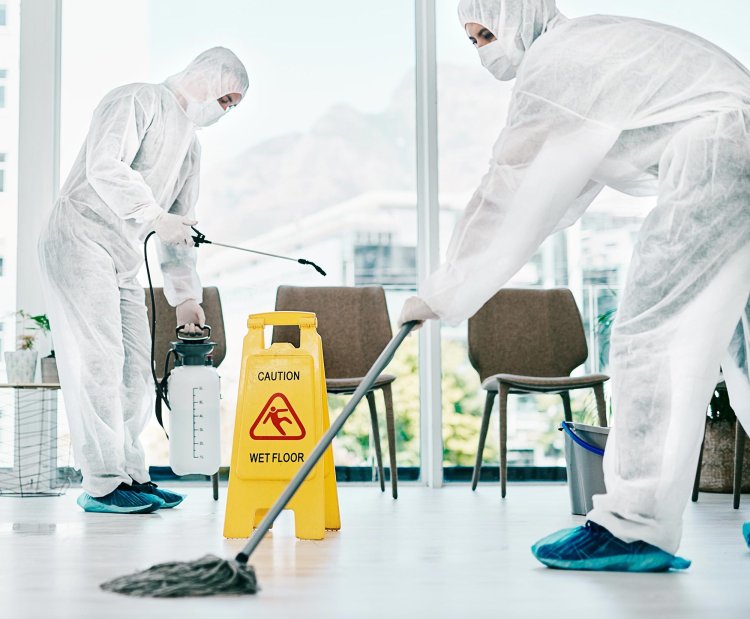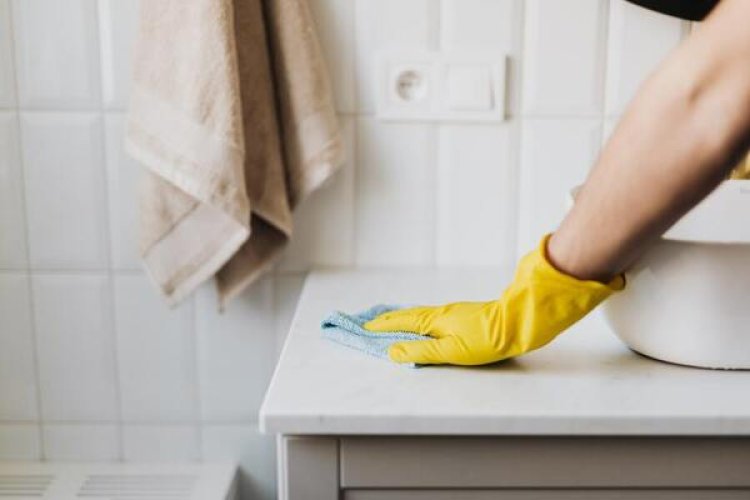Tricks to Encourage Kids to Clean Their Room
Discover effective tricks to encourage your kids to clean their room in a positive and engaging way. Set clear expectations, turn cleaning into a game, make it a joint effort, and celebrate achievements. Teach your children about responsibility and the importance of cleanliness.
Share this Post to earn Money ( Upto ₹100 per 1000 Views )

Do you find yourself constantly battling with your kids over the state of their messy rooms? Toys scattered across the floor, clothes piled up, and a general sense of chaos can be a daily struggle for many parents.
Teaching cleanliness helps them understand the importance of taking care of their personal space and instills valuable life skills that will benefit them as they grow. By encouraging them to clean their rooms, we empower them to be organized, independent, and accountable for their surroundings.
By incorporating these strategies, you can make cleaning a collaborative and enjoyable experience for both you and your children. Say goodbye to constant nagging and frustration, and say hello to a cleaner and more harmonious living space. Let's dive in and discover the tricks that will revolutionize the way your kids approach cleaning their rooms.

Set Clear Expectations
Setting clear expectations and establishing a routine are crucial steps in encouraging kids to clean their room. Sit down with them and explain the importance of maintaining a clean and organized living space. Discuss the benefits of having a tidy room, such as being able to find things easily, creating a calm environment, and feeling proud of their personal space.
When it comes to assigning specific tasks and responsibilities, be specific and age-appropriate. Break down the cleaning process into manageable steps and explain each task clearly. Make sure to provide guidance and demonstrate how to do each task properly.
One effective way to communicate the tasks involved is by creating a checklist or chart that outlines the cleaning responsibilities. This visual aid serves as a reminder and helps children stay organized. You can involve your kids in creating the chart, allowing them to contribute their ideas and preferences.
Turn Cleaning into a Game
The effectiveness of turning cleaning into a game lies in its ability to capture their attention, foster a sense of enthusiasm, and promote a positive attitude towards tidying up their space.
One creative game is the "Race Against the Clock." Set a timer and challenge your kids to see how quickly they can tidy up their room. This game adds an element of excitement as they try to beat their previous time and accomplish the task faster each time. Another idea is the "Sorting Challenge." Give your kids different colored bins or baskets and ask them to sort their toys, books, or clothes into the corresponding containers. This not only makes cleaning a game but also helps them learn about categorization and organization.
Emphasize the importance of positive reinforcement and rewards throughout the cleaning process. Offer praise and encouragement as they complete tasks or achieve milestones. Consider creating a reward system where they earn points or stickers for each cleaning task completed, which can later be exchanged for small incentives or privileges. This encourages a sense of accomplishment and motivates them to continue keeping their room tidy.
Remember to be creative, adaptable to their interests, and always provide positive reinforcement along the way. Cleaning will no longer be seen as a chore but as an exciting challenge to conquer together.
Make it a Joint Effort
Cleaning and organizing a room can feel overwhelming for kids, but involving them in the process can make a significant difference. Making it a collaborative effort helps children develop a sense of ownership and teamwork while additionally showing them the value of responsibility and cleanliness.
Stress the significance of involving kids in the decision-making process.
Discuss with your children how they envision their room to look and what changes they would like to make.This not only makes them feel appreciated but also motivates them to claim their space as their own.
Discuss the benefits of working together as a team to clean and organize their room.
Cleaning as a team creates a positive and supportive environment. Explain to your kids that when everyone contributes, the workload becomes lighter, and the cleaning process becomes more enjoyable. Emphasize the benefits of a clean and organized room, such as finding things easily and having a peaceful space to relax in.
Share strategies for dividing tasks and making cleaning a collaborative effort.
Divide cleaning tasks among family members based on age and capability. Assign age-appropriate tasks to each child and rotate them regularly to avoid monotony. Consider turning cleaning into a game, where each child competes to finish their tasks first or earns points for completing their responsibilities. This makes cleaning more engaging and encourages friendly competition.
Encourage your kids to help one another and offer assistance when needed. If you need a professional cleaner, then you can call for home cleaning services in gurgaon to help children as well as yourself to clean the home.
Create a Cleaning Schedule
When it comes to getting youngsters to clean their rooms, keeping a regular cleaning routine can do wonders. It not only instills a feeling of routine and accountability, but it also aids in maintaining their space's organization and cleanliness.
Benefits of Having a Regular Cleaning Schedule
Having a set schedule for cleaning their room brings numerous benefits. Firstly, it eliminates the overwhelming feeling of a messy room by breaking down the cleaning tasks into manageable chunks. Secondly, it helps kids develop time management skills as they learn to allocate specific time slots for cleaning. Lastly, it creates a sense of predictability and consistency, making cleaning a part of their daily or weekly routine.
Creating a Visual Cleaning Chart or Checklist
One effective way to create a cleaning schedule is by using a visual cleaning chart or checklist. You can create a chart using colorful stickers, markers, or even digital apps. Break down the cleaning tasks into smaller steps, such as making the bed, picking up toys, organizing shelves, and vacuuming. Encourage your kids to check off each task once completed, providing them with a sense of accomplishment and progress.
The Value of Consistency in Keeping Things Clean
By following a cleaning schedule consistently, kids develop a habit of tidiness that becomes ingrained in their daily routine. It also prevents the accumulation of clutter and ensures that their room stays clean for a longer period of time. Consistency reinforces the importance of cleanliness and teaches kids the value of taking care of their personal space.
Read It : 8 Tips to clean your freeze
Celebrate Achievements
Recognizing their hard work not only boosts their self-esteem but also reinforces the positive habit of cleanliness. Here are some strategies to celebrate their achievements and make the cleaning process more rewarding:
Emphasize the importance of acknowledging and celebrating your kids' cleaning efforts:
Let your kids know that their efforts are noticed and appreciated. Show genuine excitement and praise them for their dedication to keeping their room clean. By emphasizing the significance of their actions, you motivate them to continue their cleaning routine.
Discuss different ways to praise and reward them for their hard work:
Rewards can serve as powerful incentives for kids. Consider creating a reward system where they earn points or stickers for completing tasks. These points can be exchanged for small rewards like extra playtime, a favorite treat, or a special outing. Additionally, verbal praise and positive affirmations go a long way in reinforcing their good behavior.
Share personal anecdotes or success stories:
Share stories of your own childhood experiences with cleaning and how it helped you develop valuable skills. Talk about how a clean and organized room can create a peaceful environment, making it easier to focus and relax. Hearing personal anecdotes or success stories can inspire and motivate your kids to take pride in their own cleaning achievements.
Conclusion
In conclusion, encouraging kids to clean their rooms doesn't have to be a daunting task. By implementing a few tricks and strategies, you can transform cleaning into a positive and engaging experience for your children.
Throughout this article, we've explored various approaches to motivate kids to clean their rooms. We discussed the importance of setting clear expectations, turning cleaning into a game, making it a joint effort, creating a cleaning schedule, leading by example, and celebrating achievements. These tricks have proven effective in fostering a sense of responsibility and teaching kids the value of cleanliness.
By instilling these habits early on, you're setting them up for success in maintaining an organized and tidy living environment as they grow older.
I encourage you to implement these tricks in your own household and create a positive cleaning routine for your kids. Remember to communicate clear expectations, make cleaning fun, involve them in the process, establish a cleaning schedule, lead by example, and celebrate their efforts. With a little patience, consistency, and creativity, you'll witness your children develop good cleaning habits and take pride in their clean and organized space.

 busybucket2015
busybucket2015 













